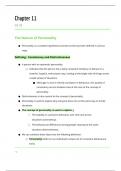Summary
Summary SLK 110 Chapter 11 notes (University of Pretoria)
- Course
- Institution
- Book
The notes cover all the necessary information within Chapter 11 of the prescribed SLK/Psychology 110 textbook. The notes are able to provide the student with in-depth knowledge about the work in this chapter.
[Show more]



